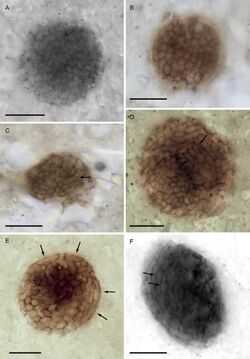Biology:Bicellum brasieri
From HandWiki
| Bicellum brasieri Temporal range: 1000 Ma
| |
|---|---|

| |
| Multiple specimens of B. brasieri, such as the holotype (A) | |
| Scientific classification | |
| Domain: | Eukaryota |
| Clade: | Amorphea |
| Clade: | Obazoa |
| (unranked): | Opisthokonta |
| (unranked): | Holozoa |
| Genus: | †Bicellum |
| Species: | †B. brasieri
|
| Binomial name | |
| †Bicellum brasieri Strother et al. 2021
| |
Bicellum brasieri is a fossil holozoan.[1] It is about 1 billion years old and could be the oldest example of complex multicellularity in the evolutionary lineage leading to the animals.[2][3] It was discovered in 2021,[3] and is named posthumously after the late palaeontologist Martin Brasier, who was a co-author of the paper that first described it.[4]
Fossil site
Bicellum was found in sediments from the Diabaig Formation in Loch Torridon, Scotland. The Diabaig Formation, considered to represent an ancient lake deposit,[5] was already known to preserve the first non-marine eukaryotes.[6]
References
- ↑ Strother, Paul K.; Brasier, Martin D.; Wacey, David; Timpe, Leslie; Saunders, Martin; Wellman, Charles H. (April 2021). "A possible billion-year-old holozoan with differentiated multicellularity". Current Biology 31 (12): 2658–2665.e2. doi:10.1016/j.cub.2021.03.051. PMID 33852871.
- ↑ "Finding the 'missing link'". BC News. June 2021. https://www.bc.edu/bc-web/bcnews/science-tech-and-health/biology-and-genetics/microfossil-reveals-missing-link-in-animal-evolution.html.
- ↑ 3.0 3.1 "Billion-year-old fossil found preserved in Torridon rocks". BBC News. 29 April 2021. https://www.bbc.com/news/uk-scotland-highlands-islands-56917272.
- ↑ "Billion-Year-Old Scottish Fossil Could Be The Oldest Proto-Animal Ever Found". IFLScience. 30 April 2021. https://www.iflscience.com/billion-year-old-scottish-fossil-could-be-the-oldest-protoanimal-ever-found-59564.
- ↑ Stewart, A. D. (2002). The Later Proterozoic Torridonian Rocks of Scotland: their Sedimentology, Geochemistry and Origin. London: the Geological Society. pp. 1–136. ISBN 1-86239-103-3.
- ↑ Strother, Paul K.; Battison, Leila; Brasier, Martin D.; Wellman, Charles H. (May 2011). "Earth's earliest non-marine eukaryotes" (in en). Nature 473 (7348): 505–509. doi:10.1038/nature09943. ISSN 1476-4687. PMID 21490597. Bibcode: 2011Natur.473..505S. https://www.nature.com/articles/nature09943.
Wikidata ☰ Q106730787 entry
 |

